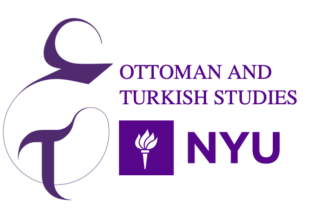
Roundtable: Making and Unmaking of the Ottoman Borders
Register Here for In-Person | Register Here for Zoom
This roundtable brings together scholars to discuss the making and unmaking of Ottoman borders in the last century of the empire. The participants will reflect on the definition of what constitutes borderlands in relation to their academic works, and what are the processes in which various experiences of territoriality can be conceptualized within the Ottoman context. Matthew Ellis will discuss the formation of southern borderlands along the Egyptian-Libyan borders in the long 19th century. David Gutman will reflect on the Armenian mobility to North America and the Ottoman efforts to control and prevent it along the eastern borderlands. Uğur Zekeriya Peçe will discuss how the island of Crete in the context of a conflict between Greece and the Ottoman Empire fits into this framework of borderlands in the late 19th century. Pınar Odabaşı Taşcı will look at Edirne, previously an imperial city in the Ottoman Balkans, that became a borderland in the early 20th century at the end of the Empire.
Matthew Ellis specializes in the social, intellectual, and cultural history of the modern Middle East. His first book, Desert Borderland: The Making of Modern Egypt and Libya, examines lived experiences of territoriality in the Eastern Sahara in the late 19th and early 20th centuries and the role these experiences played in facilitating the emergence of Egypt and Libya as modern, bordered political spaces. His broader intellectual and teaching interests include: the politics and culture of nationalism; modernity and identity formation in the Ottoman and post-Ottoman Middle East; cities and imagined urbanism; nostalgia and the politics of collective memory; popular culture; British, French, and Italian imperialism and decolonization; and the history of mass media and propaganda.
David Gutman teaches classes on a wide range of subjects including the history of the modern Middle East, migration and borders, genocide, modern China, and modern Russia. He has published numerous articles and reviews on topics including the politics of migration and mobility control, Ottoman Armenians at the end of empire, and genocide and mass violence. He is the author of The Politics of Armenian Migration to North America, 1885-1915: Migrants, Smugglers and Dubious Citizens (Edinburgh University Press 2019), and is managing editor of the Journal of the Ottoman and Turkish Studies Association.
Uğur Peçe is an Assistant Professor of History at Lehigh University. He received his PhD in History from Stanford University in 2016. His articles have appeared in Middle Eastern Studies, International Journal of Middle East Studies, and New Perspectives on Turkey. His book, Island and Empire: How Civil War in Crete Mobilized the Ottoman World, came out from Stanford University Press in 2024. He is now working on a new research project that explores auditory culture in the late Ottoman Empire and soundscapes of the 1908 Revolution.
Pınar Odabaşı Taşcı is a historian of the Middle East and the Ottoman Balkans. She holds a PhD in History from University of Akron with a dissertation titled “Ottoman Edirne in the Early 20th Century: War, Diplomacy and Violence in the Western Borderlands of the Empire on the Eve of the Nation-State”. She is currently a Visiting Scholar at the Department of Middle Eastern and Islamic Studies at NYU.
Ayşe Baltacıoğlu-Brammer specializes in Middle Eastern history with a particular focus on the early modern Ottoman and Safavid Empires. Her research delves into the complex questions surrounding the Sunni-Shi‘i conflict during this period, exploring its intricate intersections with political, religious, and fiscal legitimacy within inter-confessional and inter-imperial contact zones. At the heart of her work is an analysis of the religious dynamics in early modern Ottoman Anatolia and Safavid Iran.
Accommodation requests related to a disability should be sent to kevorkian.center@nyu.edu. A good-faith effort will be made to fulfill requests.
